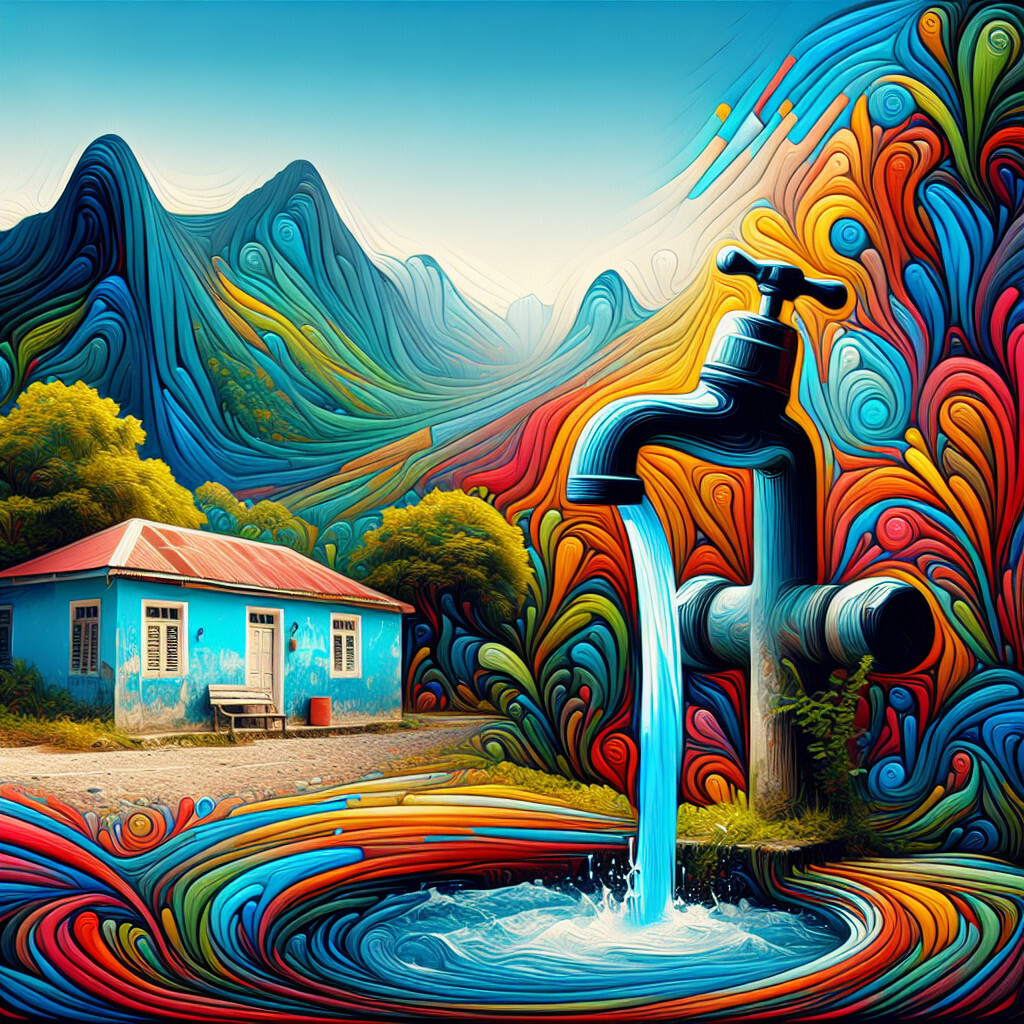-
Table of Contents
“St. Lucia’s Tap Water: Naturally Filtered, Refreshingly Pure!”
Introduction

St. Lucia’s tap water is generally considered safe to drink as it is treated and purified by the island’s water and sewage company, WASCO. The water quality is regularly monitored and meets the World Health Organization’s standards. However, due to differences in water treatment processes compared to other countries, some visitors may experience minor digestive issues. Therefore, it is often recommended for tourists to drink bottled water.
Understanding the Quality of Tap Water in St. Lucia
St. Lucia, a beautiful island nation located in the eastern Caribbean Sea, is renowned for its stunning landscapes, vibrant culture, and warm, welcoming people. However, one aspect of life in St. Lucia that often goes unnoticed by visitors is the quality of its tap water. Understanding the quality of tap water in St. Lucia is crucial for both residents and tourists, as it directly impacts health and wellbeing.
St. Lucia’s tap water is generally safe to drink, thanks to the country’s rigorous water treatment processes. The Water and Sewerage Company Inc. (WASCO), the primary water utility company in St. Lucia, is responsible for the provision and management of potable water. WASCO operates several water treatment plants across the island, where raw water is treated to meet the World Health Organization’s (WHO) guidelines for drinking water quality. The treatment process involves filtration, disinfection, and the addition of certain chemicals to kill bacteria and other harmful microorganisms.
However, the quality of tap water can vary depending on the location within the island. In urban areas like Castries, the capital city, the tap water is typically of high quality due to the proximity to water treatment facilities. On the other hand, in more remote or rural areas, the quality of tap water may be less consistent due to the challenges of water distribution and infrastructure maintenance. In such cases, residents often rely on rainwater harvesting, a common practice in St. Lucia, as an alternative source of water.
Despite the general safety of tap water in St. Lucia, it is not uncommon for tourists to experience minor gastrointestinal discomfort when they first start drinking it. This is not necessarily an indication of poor water quality, but rather a result of the body adjusting to a new environment and different water composition. As a precautionary measure, some visitors choose to drink bottled water or use water purification tablets, especially during the first few days of their stay.
It’s also worth noting that St. Lucia, like many other Caribbean islands, is vulnerable to natural disasters such as hurricanes and tropical storms. These events can disrupt water supply systems and compromise the quality of tap water. In the aftermath of such events, it is advisable to boil tap water or consume bottled water until authorities confirm the safety of the water supply.
In conclusion, the tap water in St. Lucia is generally safe to drink, thanks to the country’s stringent water treatment processes. However, the quality can vary depending on the location and circumstances. Therefore, it is always wise for both residents and visitors to stay informed about the current state of the water supply and take necessary precautions when needed. By doing so, they can ensure their health and wellbeing while enjoying all the beauty and charm that St. Lucia has to offer.
Health Implications of Drinking Tap Water in St. Lucia
St. Lucia, a beautiful island nation in the Caribbean, is renowned for its stunning landscapes, vibrant culture, and warm hospitality. However, one aspect that often raises questions among visitors and even some locals is the quality of the tap water. This article aims to shed light on the health implications of drinking tap water in St. Lucia.
St. Lucia’s tap water is generally considered safe to drink. The island’s water supply is managed by the Water and Sewerage Company Inc. (WASCO), which adheres to international standards for water quality. WASCO regularly tests the water for contaminants and ensures that it is treated with chlorine to kill bacteria and other harmful microorganisms. The water is also filtered to remove any impurities before it reaches the taps of households and businesses.
However, despite these measures, there can be variations in water quality across the island. In more remote or rural areas, the water supply may not be as reliable or as thoroughly treated. In such cases, it is advisable to boil the water before drinking or to use bottled water. Additionally, after heavy rainfall, there can be a temporary increase in the turbidity or cloudiness of the water due to runoff. While this does not necessarily indicate a health risk, it can affect the taste and appearance of the water.
The health implications of drinking tap water in St. Lucia are generally minimal, especially for those who are used to drinking treated water. The chlorine used in the treatment process can sometimes give the water a slight taste or smell, but it is not harmful. However, for individuals with sensitive stomachs or those not accustomed to drinking treated water, there may be a slight risk of gastrointestinal discomfort.
It’s also worth noting that St. Lucia, like many other Caribbean islands, faces challenges related to water scarcity and climate change. These issues can impact the availability and quality of tap water. For instance, during periods of drought, the water supply may be reduced, leading to a higher concentration of minerals in the water. While these minerals are not harmful in small amounts, they can affect the taste of the water and, in rare cases, may contribute to kidney stones or other health issues if consumed in large quantities over a long period.
In conclusion, while the tap water in St. Lucia is generally safe to drink, there can be variations in quality depending on the location and weather conditions. Visitors and locals alike are advised to stay informed about the current water conditions and to take precautions if necessary, such as boiling water or using bottled water. By doing so, they can ensure that they stay hydrated and healthy while enjoying all that this beautiful island has to offer.
The Process of Water Treatment in St. Lucia
St. Lucia, a beautiful island nation in the Caribbean, is known for its stunning landscapes, vibrant culture, and pristine beaches. However, one aspect that often goes unnoticed is the quality of its tap water. The process of water treatment in St. Lucia is a complex one, ensuring that the water is safe for consumption and use.
The water treatment process in St. Lucia begins with the collection of raw water from various sources. The island is blessed with an abundance of natural water resources, including rivers, springs, and wells. This raw water is then transported to treatment plants where it undergoes a series of purification processes.
The first step in the purification process is coagulation and flocculation. This involves the addition of chemicals to the raw water, which causes the tiny particles suspended in the water to bind together and form larger particles, known as flocs. These flocs are then removed from the water through a process called sedimentation.
Following sedimentation, the water undergoes filtration, where it is passed through layers of fine sand and gravel. This process removes any remaining particles and impurities from the water. The water is then disinfected to kill any remaining bacteria, viruses, and other harmful microorganisms. This is typically done using chlorine, although other methods such as ultraviolet light or ozone may also be used.
Once the water has been thoroughly treated, it is stored in clean tanks before being distributed to homes and businesses across the island. The Water and Sewerage Company Inc. (WASCO), the national water and sewerage utility company in St. Lucia, is responsible for the treatment and distribution of water on the island. WASCO regularly monitors the quality of the water to ensure it meets the standards set by the World Health Organization.
Despite the rigorous treatment process, it is important to note that the quality of tap water can vary across different parts of the island. In some rural areas, the water supply may be less reliable, and the water may not be as thoroughly treated. Therefore, it is always advisable to use a water filter or to boil the water before consumption, particularly in these areas.
In conclusion, the tap water in St. Lucia undergoes a comprehensive treatment process to ensure it is safe for consumption. This process involves several stages, including coagulation and flocculation, sedimentation, filtration, and disinfection. The water is then stored and distributed across the island by WASCO. While the quality of tap water is generally good, it can vary in different parts of the island, and additional precautions may be necessary in some areas. Therefore, while enjoying the natural beauty and vibrant culture of St. Lucia, one can also appreciate the efforts that go into ensuring the quality of its tap water.
Comparing Bottled Water and Tap Water in St. Lucia
St. Lucia, a beautiful island nation in the Caribbean, is known for its stunning landscapes, vibrant culture, and warm, welcoming people. However, one question that often arises among visitors and potential residents is about the quality of the tap water. Is it safe to drink? How does it compare to bottled water? These are valid concerns, especially for those who are used to the convenience and perceived safety of bottled water.
In St. Lucia, the water supply is managed by the Water and Sewerage Company Inc. (WASCO), which is responsible for the collection, treatment, and distribution of water throughout the island. The water is sourced from rivers and springs, treated to remove impurities, and then distributed to households and businesses. WASCO adheres to strict quality control measures to ensure that the water is safe for consumption. Regular testing is conducted to monitor the levels of various substances in the water, including bacteria, chemicals, and other potential contaminants.
Despite these measures, the quality of tap water can vary depending on the location. In urban areas, where the water infrastructure is more developed, the tap water is generally safe to drink. However, in rural areas or during periods of heavy rainfall, the water quality can be compromised due to runoff from agricultural areas or contamination from untreated sewage. In such cases, it is advisable to boil the water before drinking or to use a water filter.
On the other hand, bottled water is a popular choice for many people in St. Lucia, particularly tourists. It is widely available in supermarkets, restaurants, and hotels, and is often perceived as being safer and more convenient than tap water. However, it’s important to note that not all bottled water is created equal. Some brands simply bottle tap water, while others use spring water or purified water. The quality of bottled water can also vary depending on the source and the bottling process.
While bottled water may seem like the safer option, it’s worth considering the environmental impact. The production and disposal of plastic bottles contribute to pollution and waste, and can have a negative impact on the island’s delicate ecosystems. Moreover, bottled water is significantly more expensive than tap water, which can add up over time.
In conclusion, both tap water and bottled water have their pros and cons in St. Lucia. The tap water is generally safe to drink, especially in urban areas, and is subject to rigorous testing and quality control measures. However, the quality can vary depending on the location and weather conditions. Bottled water, while often perceived as safer and more convenient, can vary in quality and has a significant environmental impact. Ultimately, the choice between tap water and bottled water depends on individual preferences and circumstances. Regardless of the choice, it’s always important to stay hydrated, especially in the tropical climate of St. Lucia.
Q&A
1. Question: Is the tap water in St. Lucia safe to drink?
Answer: While the tap water in St. Lucia is generally considered safe to drink, it’s recommended for tourists to drink bottled water to avoid potential stomach issues.
2. Question: What is the quality of tap water in St. Lucia?
Answer: The quality of tap water in St. Lucia is generally good as it is treated and purified, but it may vary depending on the specific area.
3. Question: Is the tap water in St. Lucia chlorinated?
Answer: Yes, the tap water in St. Lucia is typically chlorinated as part of the treatment process to kill bacteria and other microorganisms.
4. Question: Can the tap water in St. Lucia cause health issues?
Answer: While the tap water in St. Lucia is generally safe for locals, it may cause minor stomach issues for tourists due to the change in water composition from what they are used to.
Conclusion
The tap water in St. Lucia is generally considered safe to drink. However, as it can vary in quality depending on the area and the source, some visitors may choose to drink bottled water to avoid potential health issues.






